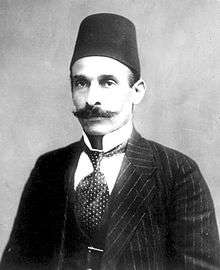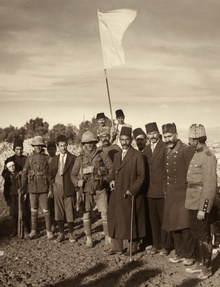Hussein al-Husayni

Hussein Bey al-Husayni (Arabic: حسين الحسيني) (unknown-1918) was mayor of Jerusalem from 1909 to 1917 during Ottoman rule of Palestine.
Born into the prominent Jerusalemite Arab family of al-Husayni, his father Salim al-Husayni, had also served as mayor of the city.[1]
Under Hussein's leadership, the city went through high development because he initiated the paving of roads, which ensured cleaner streets, and started construction of a sewage network project which was partly financed from Jewish communities outside Palestine. In an interview with the Egyptian Al-Iqdam newspaper in March 1914, he stressed the distinction between Zionism, which did not threaten Palestine, and he believed to be the real risk to the local Arab community from the Jewish settlers movement; and the subsequent necessity to prevent land sales to Jews. Al-Husayni also served as Director of the Red Crescent Society, established in 1915 and promoted Arab-Jewish understanding.[1]

He helped foster Muslim, Jewish and Christian cooperation in an attempt to create a "post-Ottoman" alternative. On December 9, 1917, after the Allied Forces led by General Allenby had conquered the city from the Ottomans, al-Husayni formally surrendered Jerusalem to the British Military Administration.[2] He signed an official decree of surrender a few days later, handing the keys of the city gates to Allenby. A couple of weeks after the surrender in January 1918, he died. After a brief term by Aref al-Dajani, Hussein's brother Musa al-Husayni became mayor of Jerusalem.[1]
References
- 1 2 3 Palestinian Personalities - H Palestinian Academic Society for the Study of International Affairs (PASSIA).
- ↑ Benvenisti, Meron (1998). City of Stone: The Hidden History of Jerusalem. University of California Press. p. 118. ISBN 978-0-520-91868-9.
